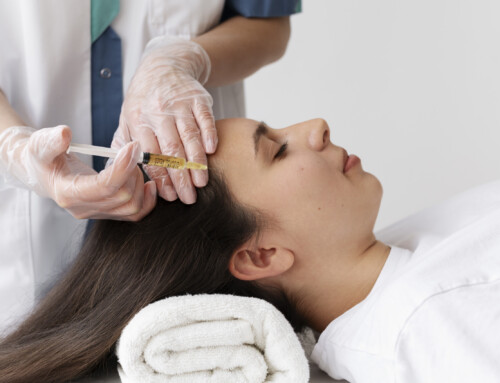Intro
When you have a splitting headache, it's natural to wonder if it could be a sign of a more serious condition, such as high blood pressure. High blood pressure, or hypertension, is a common health issue that can lead to severe complications if left unmanaged. While it often goes undetected due to its lack of visible symptoms, one sign that could indicate its presence is frequent and severe headaches. In this post, we will take you through understanding the connection between headaches and high blood pressure, identifying symptoms, the risk factors, how to lower your blood pressure, when to seek medical help, and how Wake Spine & Pain can assist you.
Understanding the Connection Between High Blood Pressure and Headaches
High blood pressure is often a silent culprit, causing harm to your vital organs without giving off obvious warning signs. This is why it is often referred to as the "silent killer." The most common misconception is that headaches are a common symptom of high blood pressure, but this is not necessarily true. In most instances, high blood pressure is asymptomatic, meaning it doesn't show any outward signs until substantial damage has been done.
The link between headaches and high blood pressure becomes significant when considering a hypertensive crisis. This is a severe medical condition where blood pressure spikes unexpectedly and to dangerous levels. If your blood pressure reading exceeds 180/120 mm Hg, you are likely experiencing a hypertensive crisis. This alarming state of hypertension may be accompanied by a severe headache, which is not an ordinary headache but an indication of something much more serious. It might also come with other concerning symptoms such as visual disturbances, nausea, or even chest pain.
In a hypertensive crisis, the intense pressure of blood flow can cause blood vessels to become inflamed and leak fluid or blood, leading to hypertensive encephalopathy. This brain swelling can cause headaches, along with a range of other neurological symptoms. Thus, if you notice a sudden, severe headache paired with other alarming signs like visual problems or nausea, you might be experiencing a hypertensive crisis, and immediate medical attention is warranted.
On a final note, it's essential to understand that routine headaches are not typically linked to high blood pressure. However, if you experience chronic headaches, it's a good idea to consult your healthcare provider to rule out underlying conditions, including hypertension. Additionally, untreated high blood pressure can increase the risk of conditions that cause headaches, such as stroke. Therefore, maintaining a healthy blood pressure is a crucial step in preventing headaches and promoting overall brain health.
Symptoms of High Blood Pressure-Induced Headaches
High blood pressure can manifest itself through various symptoms, among which a severe headache can be one significant indicator. However, it is important to note that these aren't your everyday headaches. Often described as throbbing or pulsating sensations, these headaches commonly affect both sides of the head.
But the presence of a headache alone does not necessarily imply a high blood pressure issue. It's the accompanying symptoms that warrant immediate attention. These can range from dizziness and blurred or double vision to more severe ones like nosebleeds and shortness of breath. Nausea or vomiting can also be experienced in conjunction with these headaches.
These symptoms can be potentially life-threatening and require prompt medical intervention. Keep in mind, though, that these symptoms do not occur in everyone with high blood pressure. However, if you do experience a combination of these symptoms, especially if the headache is severe and sudden, it is strongly advised to seek medical help without delay.
The key lies in understanding that these headaches and their associated symptoms are not typical, and could indicate a serious hypertensive crisis. Awareness of these symptoms can be the first step in getting the necessary help and potentially preventing major complications.
Risk Factors for High Blood Pressure
Understanding the risk factors for high blood pressure can play a pivotal role in its prevention and management. There are various elements that can contribute to an increased likelihood of developing hypertension.
Firstly, age is a substantial factor. The risk of high blood pressure increases as you get older due to the natural aging process of your arteries becoming stiffer and narrower. Family history also plays a part - if your parents or other close blood relatives have high blood pressure, you're more likely to develop it.
Physical attributes and lifestyle choices heavily influence the development of high blood pressure. Being overweight or obese is a key risk factor. The more you weigh, the more blood your body needs to supply oxygen and nutrients to your tissues, which puts additional pressure on your artery walls. Physical inactivity contributes to higher heart rates, making your heart work harder with each contraction, leading to stronger force on your arteries and elevating your blood pressure.
Harmful habits like tobacco use and excessive alcohol consumption can also heighten your blood pressure. Nicotine in tobacco can cause your blood vessels to narrow, increase your heart rate, and cause your heart to work harder. Alcohol, if consumed excessively, can gradually damage your heart.
Moreover, a diet that is high in salt and low in potassium can tip the balance of minerals in your body, causing high blood pressure. Chronic kidney disease can also lead to hypertension, as it disrupts the natural balance of salts and fluid in your body.
Lastly, stress is an often overlooked but significant contributor to high blood pressure. Chronic stress or short-term stress can lead to temporary, but dramatic, spikes in your blood pressure. Moreover, coping mechanisms for stress, like eating unhealthy foods, smoking, or drinking alcohol, can also lead to hypertension.
By understanding these risk factors, you can take actionable steps towards their mitigation, and thus, reduce the risk of developing high blood pressure.
How to Lower Your Blood Pressure
Adopting certain healthy behaviors can have a significant impact on decreasing your blood pressure. Committing to a regular exercise routine is one of the most effective strategies. Engaging in moderate physical activity for at least 150 minutes per week, or vigorous aerobic activity for 75 minutes per week, can lower your blood pressure by about 5 to 8 mm Hg.
Your diet plays a vital role in managing your blood pressure too. Incorporate an eating plan that emphasizes fruits, vegetables, whole grains, and low-fat dairy products. Aim to reduce your sodium intake to less than 1,500 milligrams a day, and be sure to consume adequate potassium, which can counter the effects of sodium on blood pressure.
Keeping a healthy weight is another crucial step. Blood pressure often increases as weight increases. Losing just 10 pounds can help reduce your blood pressure. In addition to shedding extra pounds, you should also keep an eye on your waistline. Carrying too much weight around your waist can put you at greater risk of high blood pressure.
Smoking and drinking alcohol excessively can raise your blood pressure and damage your blood vessels, leading to heart disease. If you smoke, make efforts to quit. If you drink alcohol, do so in moderation. Limiting your drinks to two a day for men and one a day for women can typically lower your blood pressure by about 4 mm Hg.
Lastly, it's crucial to find ways to manage stress as it can be a contributing factor to high blood pressure. Consider techniques like deep breathing, yoga, or meditation. It's not just the stress, but also your reactions to stress that might raise your blood pressure. Unhealthy stress coping mechanisms, such as overeating, smoking, or drinking alcohol, can exacerbate the issue.
In some cases, despite lifestyle changes, medications might be necessary to lower your blood pressure. It's crucial to follow your healthcare provider's recommendations regarding any prescribed medication regimen. In conjunction with lifestyle modifications, they can effectively manage your high blood pressure.
When to Seek Medical Attention
While making lifestyle changes can significantly aid in controlling high blood pressure, it's equally essential to remain in close consultation with a healthcare professional to ensure proper diagnosis and timely treatment. Headaches linked to high blood pressure are not to be taken lightly. If you experience a headache that is intense, unexpected, and is accompanied by other symptoms such as confusion, fainting, or high fever, it is important to seek immediate medical care. These symptoms could indicate a hypertensive crisis, which is a serious medical emergency.
Regular health check-ups are also invaluable in managing high blood pressure. Routine visits to your healthcare provider can help you monitor your blood pressure levels and provide an opportunity to adjust treatment plans if needed. It is important to remember that even if your symptoms improve, you should continue regular check-ups and maintain your medication regimen if one has been prescribed. Stopping or changing medications without a healthcare professional's guidance can lead to severe health complications.
While awareness and self-care are vital, remember that medical professionals are an essential part of your team in managing high blood pressure. Don't hesitate to reach out for help when needed, as it could be the difference between maintaining good health or facing serious complications. Reach out to Wake Spine & Pain for any concerns related to high blood pressure or headaches. Our team is ready to provide the guidance you need.
The Role of Wake Spine & Pain in Managing Your High Blood Pressure and Headache
At Wake Spine & Pain, we are committed to providing you the highest quality care in managing high blood pressure and the associated headaches. Our multidisciplinary team of experts utilizes a holistic approach to develop a customized treatment strategy for each patient. We place great emphasis on medication management, enabling patients to effectively use their prescribed drugs to control their blood pressure levels while minimizing potential side effects.
Recognizing the importance of lifestyle modification in controlling hypertension, our team offers guidance on the necessary dietary changes, exercise regimes, and weight loss strategies. We strive to help patients reduce their sodium intake, increase their physical activity levels, and achieve a healthy weight, among other things. Our team also provides tips on stress management techniques like deep breathing, yoga, or meditation, to assist in managing a key risk factor for high blood pressure.
For those suffering from headaches linked to high blood pressure, our pain management therapies provide relief and improve quality of life. By using a combination of innovative techniques and proven therapies, we aim to alleviate pain and discomfort related to these headaches.
In addition, we believe in empowering our patients through education. We offer resources and support to enhance your understanding of high blood pressure and headaches, their linkages, symptoms, risk factors, and prevention strategies. This knowledge empowers you to make informed decisions about your health and enables you to actively participate in your treatment plan.
Remember, at Wake Spine & Pain, you are not alone in your healthcare journey. Our team stands ready to assist you every step of the way, guiding you towards better health and wellbeing.
Appointment Request

Unlocking Relief: Do Trigger Point Injections Really Alleviate Muscle Pain?
Intro Muscle pain is one of the most common complaints patients bring to pain management specialists. It can range from a dull ache to sharp, stabbing discomfort that limits mobility and disrupts daily life. While rest, medications, and therapy help many people, others find their pain stubborn and long-lasting. In such cases, trigger point injections

Is Your Back Pain From Stress? Learn the Signs of Psychosomatic Pain
Intro Are you tired of dealing with persistent back pain that just won’t go away? You’re not alone. Many people suffer from chronic discomfort, but what if the source of your pain isn’t a physical issue at all? Unraveling the mystery of back pain can often lead to an unexpected culprit: stress. As our lives

Back Pain Uncovered: Muscle Strain vs. Disc Problems – How to Tell the Difference

Walking and Arthritis: Pain Relief Tips for Easier, Healthier Steps
Intro Living with arthritis can feel like an uphill battle, each step accompanied by discomfort that weighs heavily on your daily life. But what if the key to alleviating that pain lies in something as simple as walking? This gentle, natural activity not only promotes joint health but also enhances mood and overall well-being. In

Spondylolisthesis vs Spondylosis: Understanding the Differences and Finding the Right Treatment

Understanding Spondylolisthesis: Causes, Symptoms, and Treatment Options

When to See a Spine Specialist for Back Pain: Key Signs & Symptoms

What to Avoid With Degenerative Disc Disease: An Expert’s Advice










